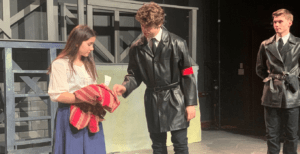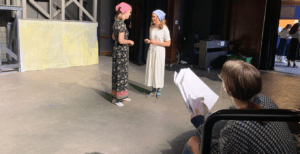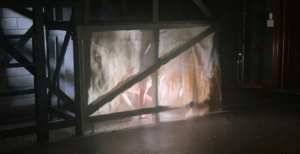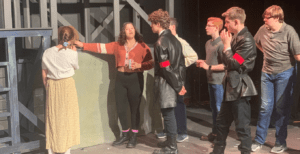As actors, Carly Joseph and Abby Anderson are used to being on stage. But on a recent Sunday afternoon, the two were doing everything else: Crawling through scenery to test a lighting effect, workshopping new lines, marking the floor for recently-obtained props, and trying to usher a cast of peers through one of their final rehearsals.
All in a day’s work for these first-time playwrights and directors.
Carly and Abby, inspired by their time in the Witness Theater program which had been run by Yachad, co-wrote the play The Only Star I Remember, which will be running at Blue Water Theatre Company in Wayzata on Jan. 23-26. The play is based on the story of Esther Reicher, Abby’s now 91-year-old great-grandmother and how she survived the Holocaust.

Sofia Sanchez is handed an armband she must wear that has a Star of David on it by Gunnar Laughlin and Ryan Skarphol.
“We were both in Witness Theater and were inspired by that,” said Carly, a junior at St. Louis Park High School. “And then since they only had a two-year grant to run the project, I wanted it to keep happening. So I was like, ‘Hey, Abby want to run our own version?’”
The playwrights said that the show is not 100 percent accurate, but it is more than just being based on Reicher’s life and survival.
“We’ve had to take some artistic liberty with certain things, like with names of some people; she didn’t know the names of everybody, so we had to find names (of people who were in the camps),” Carly said. “We got most of our information from Steven Spielberg. When they were working on Schindler’s List, he recorded as many stories as he could. So he sent his assistant and they recorded her story. So we got most of our information from a documentary. She’s gotten to a point where she just like does not want to talk about it very much anymore. But she gave us her consent her write it.”
For Abby, a Wayzata High School senior, writing the show meant getting the buy-in from her family – which was difficult.
“It’s just that it has gotten more difficult for my great grandmother talking about it over the years, so I knew that doing a project like this might bring up some painful memories for her. And I really did not want that,” said Abby, who has cousins Lindsey Long, Harry Long, and Talia Segal in the show. “And I’ve collected her experiences in the past too. So I have a bunch of prior knowledge on her story enough to the point where we could write a whole script based on the stuff that I already knew and I already have documented.
“I was fine with asking. Now it gets a little difficult because I just want to be truthful. That’s one of the most stressful things is we try to take like as little artistic license as possible, but sometimes we don’t have all the information yet to connect in some way.”
Playing Abby’s great grandmother is Caelan Petit, who said that when she read through the script, this was a role she was really looking forward to playing.
“It’s the significance of like her story and making sure that this important piece of history is like being told,” she said. “I just really wanted to help guide this show.”
While not related to the subject like Abby is, Caelan said the nerves are different than other shows she has been in.
“I think this one makes me a little more nervous just because of how personal it is,” she said. “This is my most favorite show that I’ve ever been a part of.”
Abby said that there probably wasn’t any way to make the story 100 percent accurate.
“As she gets older, she remembers new things, forgets other things,” she said. “So we’re just piecing together the stuff we have, hopefully in pretty accurate order.”
Unlike other shows where the script is set, the cast has been empowered to make suggestions. Even with the show opening less than two weeks away, Ryan Skarphol – who plays one of the Nazi guards, among other parts – was making suggestions that could improve the flow of certain scenes.
“It’s different, but because we wrote it, we can change things as we go,” Abby said of the script changes and show tweaks. “It’s also a little different because I still go to my great-grandma and I still talk to my grandma, and every time I go, I get new information. So as we’ve been doing this, we’ve had to switch things around because of new information.”
Carly compared the process to her Witness Theater experience. In that program, the students wrote and directed a play as a cast based on the stories of Holocaust survivors.
“When we wrote this, we wanted people to have an influence on it. That’s like something I always want as a performer is to be able to say, ‘Hey, I have an idea,’” Carly said. “So let’s let everybody have ideas. And let’s go through it. You don’t get as good of a project as you do when you have a bunch of different people collaborating on it. So I think the final product will be better with everybody’s collaboration. It seems messy in the process, but it gets to a point where we get this final scene, and I really like how well it turns out.”
As much collaboration and buy-in from the cast as Carly and Abby were willing to discuss, they still left no doubt who was in charge. From trying to get everyone to be quiet and listen to how they were going to run through a certain scene, to getting old fashioned sewing machines lined-up just right on stage, the process has to run smoothly to produce a final product on stage.
“It was scary at first to tell all my friends what to do,” Carly said. “But I think we found a point. I think we all respect each other in this process. And that’s something that’s really important, I think. We’re still friends when we’re here, but when we’re here it’s about putting on a show.”




